How Unhealthy Diet Could Trigger Inflammatory Arthritis
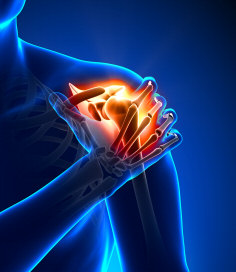 The way in which unhealthy diets are linked to inflammatory arthritis is a
complex process but research shows that the intestinal wall, foreign proteins,
and molecular mimicry are some of the contributing factors that can lead to
inflammatory arthritis. The way in which unhealthy diets are linked to inflammatory arthritis is a
complex process but research shows that the intestinal wall, foreign proteins,
and molecular mimicry are some of the contributing factors that can lead to
inflammatory arthritis.
Diet has been linked to the development of certain forms of arthritis like
rheumatoid arthritis with many patients showing improvement in their arthritic
condition when they eliminate certain foods like dairy products. However, the
way in which diet factors contribute to arthritis is complex and less
understood. Some theories have tried to explain the intricate processes that
occur when people susceptible to contracting arthritis ingest certain foods.
Understanding the role diet plays in managing arthritis can help alleviate and
minimize symptoms associated with this condition.
What is inflammatory arthritis?
Arthritis occurs when joints become inflamed due to an autoimmune response
triggered by environmental elements. The inflammation of joints can occur due to
many things such as injuries, diseases, bacterial infection, unhealthy foods,
and the introduction of toxic substances in the body.
Inflammatory arthritis is a collective term that refers to autoimmune
diseases involving the inflammation in joints. The body’s immune system can act
abnormally causing the body to attack its own healthy tissue. Inflammatory
arthritis can affect people of all ages and many who live with the condition may
not show visible signs of the disease until it has progressed.
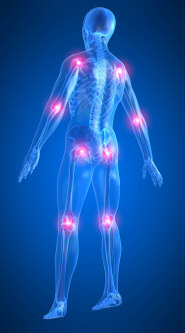 Although a few arthritis conditions may be treated when the known causal
factor is identified. Traumatic arthritis is caused by injuries sustained to the
joints. Unfortunately, arthritis conditions of no-known-cause have no cure and
can only be managed through different therapies. The cause of the arthritis
determines the type of arthritis a patient is suffering from and treatment options. Although a few arthritis conditions may be treated when the known causal
factor is identified. Traumatic arthritis is caused by injuries sustained to the
joints. Unfortunately, arthritis conditions of no-known-cause have no cure and
can only be managed through different therapies. The cause of the arthritis
determines the type of arthritis a patient is suffering from and treatment options.
If the condition is caused by a bacterial infection, it is termed as
supparative arthritis. Gouty arthritis occurs when the body triggers an
autoimmune reaction in response to an over accumulation of uric acid crystals.
Also known as septic arthritis, people with artificial limbs and implants are at
a much higher risk than the general population. Moreover, the arthritis
conditions arising from no-known-cause are categorized into inflammatory and
degenerative arthritis. Osteoarthritis is one example of degenerative form of
arthritis while juvenile rheumatoid arthritis is a form of inflammatory
arthritis. The most common forms of inflammatory arthritis include ankylosing
spondylitis, rheumatoid arthritis, reactive arthritis, psoriasis arthritis, and
systemic lupus erythematosus.
How the immune system can worsen arthritis?
The immune system helps in fighting foreign materials in the body such as
bacteria, virus, parasites, fungus and other unwanted materials. The immune
system is the whole function of many complex processes. It works by identifying
foreign invaders and attacks them before they can cause harm to the body.
In order for the body’s immune system to work effectively, it should be able
to differentiate between the “self” as well as “non self” cells, tissues, and
substances. Usually “self” cells are not destroyed by the immune system.
Nonetheless, “non self” substances are referred to as antigens. The proteins
found on the surfaces of pathogens like bacteria, viruses, and fungi are
antigens. When the proteins or antigens bind to special receptions released from
the defense cells, this induces a series of cell activities that allow the
immune system to recall memories stored in it and these reactions help in
defending the body from known pathogens.
Healthy cells of the body also have surface proteins and they are not
attacked by the immune system like other surface protein from foreign
substances. This is because the immune system has already identified the
specific cell proteins as self. However, in abnormal situations, the body’s
immune system can mistakenly identify its own healthy cells as “non self”, thus
triggering a condition known as an autoimmune reaction.
In arthritis conditions, the immune function works differently through
autoimmune reactions. Instead of the immune system attacking the foreign
substances it is intended to fight; it acts abnormally and attacks the healthy
tissue of the body with no obvious reason. With arthritic patients, the
autoimmune response leads to the invasion of joint tissues causing chronic pain
and inflammation.
Ways in which unhealthy diets can trigger inflammatory arthritis
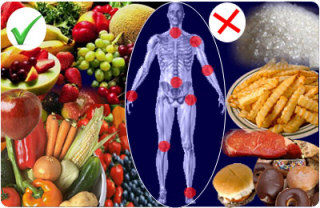 Diet plays a role in the development of arthritis but the mechanism
surrounding the link between unhealthy diets and inflammatory arthritis is less
understood. It is believed that complex processes involving the intestine and
immune system are responsible for the development of inflammatory arthritis like
rheumatoid arthritis. One of the aspects that have been associated with
inflammatory arthritis is increased intestinal permeability. The intestinal
lining provides a barrier that prevents intestinal content from entering the
interior of the body. Diet plays a role in the development of arthritis but the mechanism
surrounding the link between unhealthy diets and inflammatory arthritis is less
understood. It is believed that complex processes involving the intestine and
immune system are responsible for the development of inflammatory arthritis like
rheumatoid arthritis. One of the aspects that have been associated with
inflammatory arthritis is increased intestinal permeability. The intestinal
lining provides a barrier that prevents intestinal content from entering the
interior of the body.
In the stomach, there are large amounts of foreign proteins or antigens that
originate from microbial activities and dietary intake. The intestinal mucosa
turns large molecules into small ones in the process of absorbing and digesting
nutrients. The intestinal mucosa runs from the mouth to the anus and provides a
barrier that acts as the first line of defense against foreign substances. In
addition, the mucosa also shows the body how it can handle food-related antigens
that can trigger sensitivities and allergies.
When damage on the mucosa occurs, it can cause pathogens and unwanted foreign
proteins to get to the interior of the body triggering an immune response. Only
the smaller molecules are allowed to pass the intestinal wall and the large
ones, which may act as antigens leading to immune response, are filtered and
barred from passing through the mucosa lining.
When infections occur in the intestinal tract, they can cause gaps or
openings on the mucosa wall, which leads to increased permeability. In the same
way, toxins in body can also react with the mucosa, damaging its protective
barrier. With the damaged mucosa, large molecules can pass to the blood and this
is referred to as leaky gut or hyperpermeability.
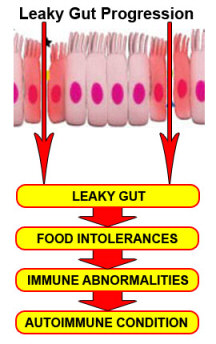 A leaky gut is simply an increased permeability of the intestinal wall. A
leaky or hyperpermeable gut allows toxins, undigested food, microbes, waste, and
large macromolecules to pass across the gut wall. Sometimes the passing of
certain substances or particles ca initiate an immune reaction. Although there
are many things that can cause a leaky gut such as parasites, infections, toxins
and medicines, poor diets are also known to contribute to this condition. A leaky gut is simply an increased permeability of the intestinal wall. A
leaky or hyperpermeable gut allows toxins, undigested food, microbes, waste, and
large macromolecules to pass across the gut wall. Sometimes the passing of
certain substances or particles ca initiate an immune reaction. Although there
are many things that can cause a leaky gut such as parasites, infections, toxins
and medicines, poor diets are also known to contribute to this condition.
An unhealthy diet made up of primarily diary and animal products can cause
inflammation of the intestinal wall, further increasing the passing of complex
antigens from diet foods and bacteria to the blood stream. The gut contains
large amounts of lymphoid tissue, which helps in protecting the body from
antigens that are trying to pass through the intestinal wall.
When unhealthy diets formulated mostly of animal protein, fat, and
cholesterol are eaten by a person, these food elements may compromise the
ability of the lymphoid tissue to attack and destroy antigens. These antigens
are trying to make their way into the interior of the body through the
intestinal wall. The compromised lymphoid tissue allows the antigens to pass
through the gut wall leading to an immune response.
Another way in which unhealthy diets are associated with inflammatory
arthritis is through the presence of foreign proteins in body. When a leaky gut
passes foreign proteins originating from food and bacteria, they end up in the
blood. These foreign or unwanted proteins are recognized by the immune system as
“not self”, meaning that they are regarded as invaders or foreign substances
like the proteins from parasites, bacteria, and viruses.
What happens is that the body makes antibodies to fight these invading
proteins and this triggers the immune response causing inflammation of joints.
During the immune function, each antibody identifies and binds itself to a
specific antigen the same way a key and lock fit into one another. In the body,
antigen and antibody complexes can result due to leaky gut. A hyperpermeable gut
can result to the body forming large complexes consisting of the foreign protein
or antigens and the antibodies.
Although the body naturally removes these large complexes, it is believed
that in some people, the rate at which the complexes are formed may be too rapid
than they are removed meaning that they accumulate within the body. Usually the
complexes are filtered by micro capillaries found in the kidney, skin, and
joints and when they are stuck in the capillaries around the joints, they can
cause inflammation to occur. This is the major cause of arthritis in adults.
Another theory that tries to explain how inflammatory arthritis may be
triggered by unhealthy diet is molecular mimicry. When foreign proteins enter
the body, they can cause the formation of antibodies, which may not be specific
to a particular foreign protein and can easily interact with similar human
proteins. To help understand how molecular mimicry plays a role in triggering
autoimmune diseases like inflammatory arthritis, it is important to examine how
the immune function works.
In the body, antibodies are created by B cells (a type of lymphocytes or
white blood cells) in response to antigens such as foreign protection, nucleic
acids, and polysaccharides. The two main types of lymphocytes or white blood
cells are B cells and T cells. The B cells secrete antibodies into the body
fluids, and these antibodies help invade foreign antigens that circulate in
blood stream.
Because the B cells cannot penetrate other cells, the T cells have the
ability to closely intermingle with their target cells meaning that they can
attack body cells that have been invaded by viruses. The immune system
identifies and recognizes a part of a foreign protein invading the body using
the T cells. These T cells have receptors, which attach themselves to short
parts of foreign proteins and they are helped in the task by macrophages.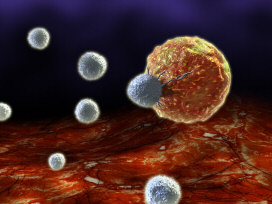
The macrophages invade foreign proteins or food particles and break them
down. Usually, microphages are antigen presenting cells, and help in showing T
cells, which foreign proteins to be attached. In a molecular mimicry situation,
the protein fragment presented to T cells by macrophages can contain parts that
resemble each other but not identical. This tricks the immune system through the
T cells to attack different proteins including self protein.
The body is made up of self proteins, which are recognized and not normally
attacked by the immune system. However, when an autoimmune reaction occurs, the
T cell attacks self proteins that are similar to those presented by the
macrophages because they contain the same string of amino acids.
Research has shown that some parts of protein found in infection causing
agents and foods also resemble parts of the self proteins of the body.
Therefore, if certain self proteins in the body take similar molecular structure
to those of complex foreign proteins, the immune system can be triggered to
attack them and this is how joints are inflamed when a person consumes cow milk.
This is because the cow’s milk has complex proteins that are similar to body’s
self protein found in the joint cartilage.
Conclusion
In essence, the body’s defense system can be promoted by a healthy diet thus
being able to remove antigens, which find their way into the interior of the
body. The defense system can also remove immune-complexes found in the blood.
When the right healthy diet is adopted, it can help minimized the complex
processes that are associated with the immune system and development of
inflammatory arthritis. Arthritis patients need to discuss with their doctors on
the right diets to include in their foods as a way of managing and preventing
the flare ups of arthritis conditions. A healthy diet enhances the immune system
and improves the functional role of the intestinal walls, which is preventing
foreign proteins of bacteria and foods origins from entering the interior of the
body. A healthy intestinal wall promotes a healthy body by reducing chances of
triggering autoimmune reactions that are responsible for many diseases such as
Crohn’s disease, Scleroderma, and arthritis.
Diseases & Conditions
Top Lists:
Top 10 Most Common Genetic Disorders
Top 15 Most Disturbing Skin Conditions
10 Unusual Phobias
Informational:
Diverticular Disease and Diverticulitis
What is Turner Syndrome and Why Does it Affect Only Females?
Alice in Wonderland Syndrome and How to Treat the Symptoms
Herniated Disc: Symptoms and Treatments
Pinch Nerve: The Cause of Remote Pain
Dealing With a Child Who Has a Fever
How Unhealthy Diet Could Trigger Inflammatory Arthritis
Phobias: Understanding How They Develop and Treatments
Depression Facts, Symptoms & Treatment
Earaches - Causes and Treatments
Symptoms of Borderline Personality Disorder and How to Deal with It
Seasonal Affective Disorder: Does Light Therapy Help?
What Really Causes Dandruff and How Can You Treat the Symptoms
Treating Plantar Fasciitis or Heel and Arch Pain
Symptoms and Treatments of Aplastic Anemia
Using Sclerotherapy to Get Rid of Varicose Veins
Are the Side Effects of HGH Supplements Worth It?
ADD/ADHD Symptoms and Treatment
What are the Options for Hair Loss Treatments
Options for Frontal Hair Loss Treatment |